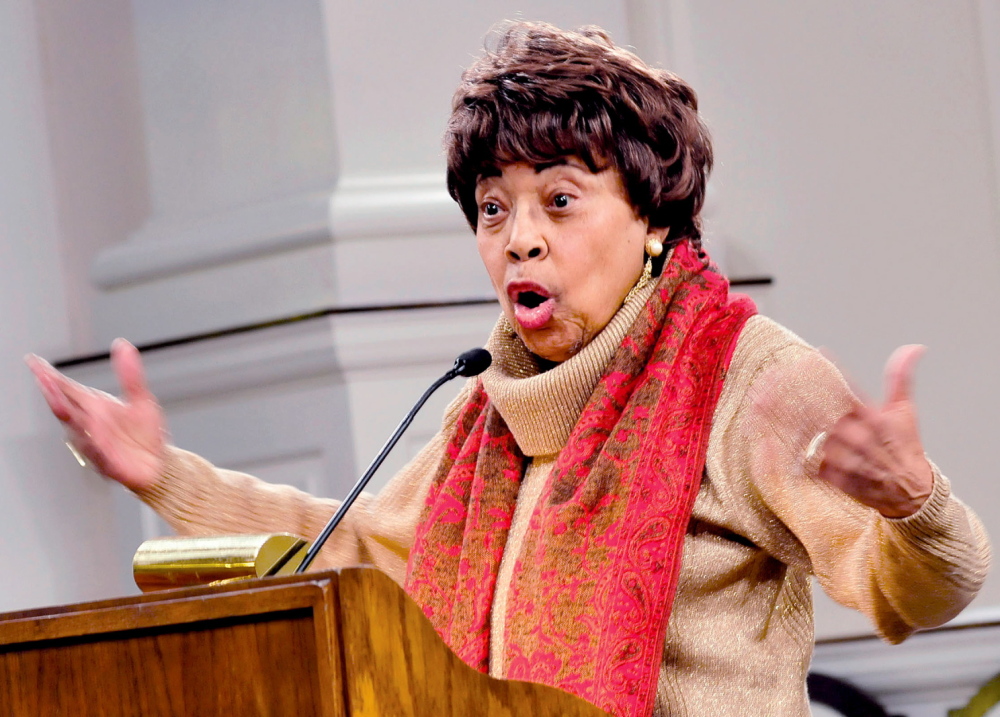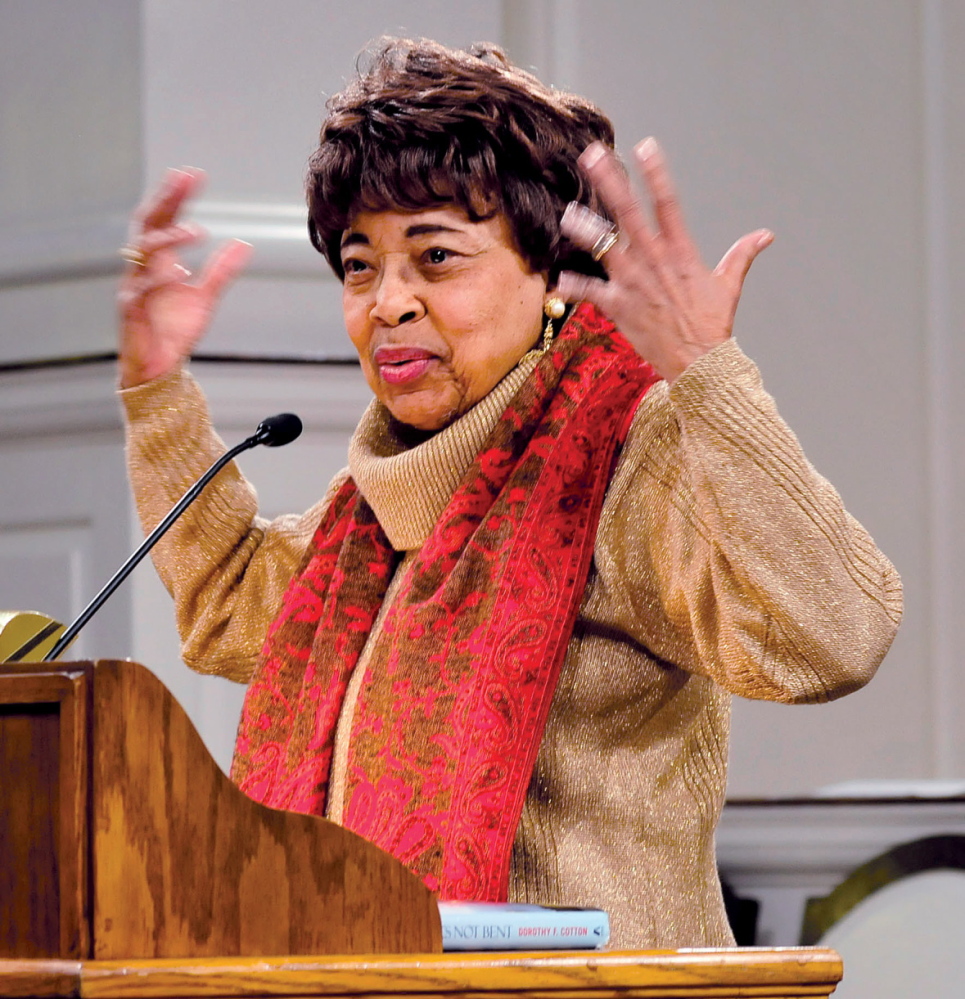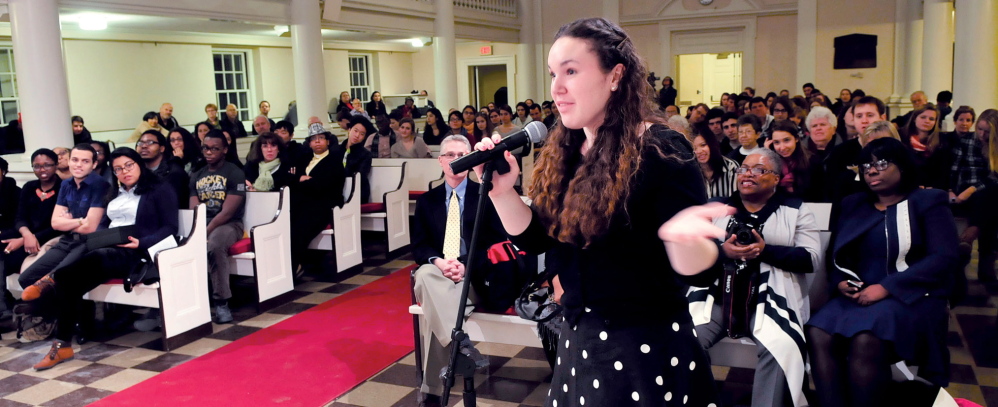WATERVILLE — Dorothy Foreman Cotton remembers when her friend Martin Luther King Jr. was nominated for the Nobel Peace Prize.
“I was out on the sidewalk saying, ‘We won, we won!’” Cotton said Monday.
She had worked with King during the civil rights movement, running educational training workshops, helping people to understand that they had rights as U.S. citizens, that nonviolent protest was important and that the system had to change.
“We were relegated to a place of non-citizenship,” Cotton told a crowd at Colby College’s Lorimer Chapel. “We people who were of my skin hue — and others as well — were relegated to a place of noncitizens.”
Cotton, 83, was considered the highest-ranking woman in the Southern Christian Leadership Conference in the 1960s and accompanied King and his family and friends to Oslo when he received the Nobel Peace Prize in 1964.
She grew up in the South during the days when she and other black citizens were not allowed to use public restrooms and could not drink from water fountains. She recalled accompanying a group of children to a beach where a group of men beat them, breaking a young girl’s nose and striking Cotton’s head so hard she lost much of the hearing in one ear.
She was not allowed to ride in the front of the bus. Her good friend, Rosa Parks, was arrested in Mongtgomery, Ala., in 1955 after she refused to give up her seat near the front of a full bus for a white man. It was a moment etched in civil rights history.
Parks, Cotton said, was a gentle seamstress whose actions in Montgomery turned the tide of history.
“The whole town just rose up in righteous indignation,” she said.
Speaking to Colby students, staff and administrators, as well as area residents, Cotton said the training workshops she was involved in during the civil rights movement were for adults who were trained to act against the “American style of Apartheid.”
They often would come to the workshops singing “I’ve Been in the Storm So Long” but after a few days had memorized the 14th Amendment, which guarantees that all people born in the United States, and naturalized citizens, have the rights guaranteed them by the Constitution, and states can’t trump those rights.
“They could stand a little taller,” she said.
King, she said, did not start the civil rights movement, and she reiterates that often because saying he started it disempowers people who came after him.
She asked the crowd Monday to envision what kind of community, country and world they want to live in and ask themselves if their actions further that vision. She said they have the power to effect change and promote a world in which people live in harmony with one another.
“We have broken down some barriers, but we have miles to go,” she said. “I want you to think about what you see the needs to be worked on.”
She asked that people envision their ideal world.
“What is your dream? Dr. King’s dream? It’s wonderful, but let it be a model. Let it be an inspiration. What can you do? If you have a vision of the kind of world you want to live in, then hold on to it.”
Cotton often gets asked what King was like. Above all, King was a human being, she said. He was a poet and a fantastic teacher who sang, played badminton and table tennis and had a good sense of humor.
She titled her recent book “If Your Back’s Not Bent: The Role of the Citizenship Education Program in the Civil Rights Movement,” after something King once said to a group of people attending an educational training workshop.
“He would say — I never forgot it — ‘Nobody can ride your back if your back’s not bent,’” she said. “It’s a metaphor for feeling like nobody. That’s all he meant by that.”
Effie McClain, pastor of Oakland-Sidney United Methodist Church, said Cotton’s speech was a powerful one.
“There was a lot in it,” said McClain, 42. “I think it was like, you got snapshots of history. It was like looking at somebody’s picture album.”
Members of Colby’s Students Organized for Black & Hispanic Unity group gave Cotton the 2014 Champion of Justice Award.
Cotton, who has received many other awards, including the National Freedom Award from the National Civil Rights Museum, told a story about when she was 11 or 12 and a little blond-haired, blue-eyed boy in her neighborhood in North Carolina rode by on his bicycle, stirring up dust and singing “Deep in the Heart of Niggertown,” a perverted version of the song “Deep in the Heart of Texas.”
That was the moment she knew all was not right in the world.
“Something was churning inside of me because something was wrong with that picture, that this boy could do that.”
The road was dusty because the road through her neighborhood was not paved. The pavement began where his neighborhood started.
Amy Calder — 861-9247 acalder@centralmaine.com Twitter: @AmyCalder17
Send questions/comments to the editors.






Success. Please wait for the page to reload. If the page does not reload within 5 seconds, please refresh the page.
Enter your email and password to access comments.
Hi, to comment on stories you must . This profile is in addition to your subscription and website login.
Already have a commenting profile? .
Invalid username/password.
Please check your email to confirm and complete your registration.
Only subscribers are eligible to post comments. Please subscribe or login first for digital access. Here’s why.
Use the form below to reset your password. When you've submitted your account email, we will send an email with a reset code.